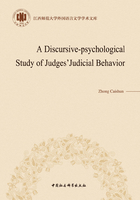
内容简介
This book adopts a discursive psychological approach to judges' judicial behaviors. Based on a close scrutiny of judges' discursive actions,this research argues that judges do not adjudicate merely by law,but also by what they care about as a social being. Their care structure is manifested in their discourse,situated and transportable identities performed in their moment—to—moment institutional discourse practice. What sets this research apart from other identity—related theorizations is that identity here is not regarded as the factor determining judges' judicial behavior but the resources judges mobilize to legitimatize or rationalize their discursive actions. This theory reorientation can highlight the dynamic tension between structure and contingency in judicial practice and shed lights on the instrumentality and temporality of judges' judicial behavior. Given this,legal concepts such as ‘justice’,‘facticity’,‘legitimacy’,etc. are also subject to respecification.